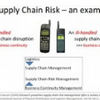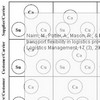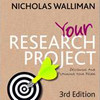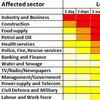 As a researcher within supply chain risk, I try to read as many academic journals as possible, and I scour the reference list of every article for hitherto unknown references. I am also extremely lucky to have access to a university library that provides electronic access to a vast number of academic journals, or acquires copies of articles in journals they don’t subscribe to free of charge. Not everybody has such provisions, but there is a solution to the problem: Many management or supply chain related websites provide the same articles for free (or sometimes at a prenium). Formatting and graphics is usually stripped out, but the content is till there. Today I’d like to promote two such websites: bnet.com and allbusiness.com.
As a researcher within supply chain risk, I try to read as many academic journals as possible, and I scour the reference list of every article for hitherto unknown references. I am also extremely lucky to have access to a university library that provides electronic access to a vast number of academic journals, or acquires copies of articles in journals they don’t subscribe to free of charge. Not everybody has such provisions, but there is a solution to the problem: Many management or supply chain related websites provide the same articles for free (or sometimes at a prenium). Formatting and graphics is usually stripped out, but the content is till there. Today I’d like to promote two such websites: bnet.com and allbusiness.com.
bnet.com
 bnet.com promotes itself as “the go-to place for management”, providing working professionals with the tools, advice, and insight they need to succeed in today’s workplace: Management Articles, Industry News, and last not least, a Business Library, with access to one of the largest databases of white papers, webcasts, and case studies on the Internet. Here is a selection of articles with the keyword supply chain risk. Many of the articles are taken from renown academic journals, such as Global Supply Chain Risk Management by Manuj and Mentzer, previously reviewed on this blog.
bnet.com promotes itself as “the go-to place for management”, providing working professionals with the tools, advice, and insight they need to succeed in today’s workplace: Management Articles, Industry News, and last not least, a Business Library, with access to one of the largest databases of white papers, webcasts, and case studies on the Internet. Here is a selection of articles with the keyword supply chain risk. Many of the articles are taken from renown academic journals, such as Global Supply Chain Risk Management by Manuj and Mentzer, previously reviewed on this blog.
allbusiness.com
 allbusiness.com promotes itself as one of the premier business sites on the Internet, helpingbusiness professionals save time and money by addressing real-world business questions and presenting practical solutions. The site offers resources including how-to articles, business forms, contracts and agreements, expert advice, blogs, business news, business directory listings, product comparisons, business guides, a business association and more. Here is a selection of articles with the keyword supply chain risk.
allbusiness.com promotes itself as one of the premier business sites on the Internet, helpingbusiness professionals save time and money by addressing real-world business questions and presenting practical solutions. The site offers resources including how-to articles, business forms, contracts and agreements, expert advice, blogs, business news, business directory listings, product comparisons, business guides, a business association and more. Here is a selection of articles with the keyword supply chain risk.
Google Scholar
![]() Google Scholar (GS) was released as a beta product in November of 2004. Since then, Google Scholar has been scrutinized and questioned by many in academia and the library field, particularly regarding the breadth and scope of available content, but is it really so un-scholarly as many say? As a recent study found out, the mean scholarliness score of citations found only in GS was 17.6% higher than the score for citations found only in licensed library databases. In fact, across all but one of the tested disciplines, citations found only in GS had a higher average scholarliness score than citations found only in licensed library databases. However, not all articles found on GS are available for free, though.
Google Scholar (GS) was released as a beta product in November of 2004. Since then, Google Scholar has been scrutinized and questioned by many in academia and the library field, particularly regarding the breadth and scope of available content, but is it really so un-scholarly as many say? As a recent study found out, the mean scholarliness score of citations found only in GS was 17.6% higher than the score for citations found only in licensed library databases. In fact, across all but one of the tested disciplines, citations found only in GS had a higher average scholarliness score than citations found only in licensed library databases. However, not all articles found on GS are available for free, though.
More?
I am sure there are more sites like this, and if you’d like to add some, please feel free to leave a comment below.












